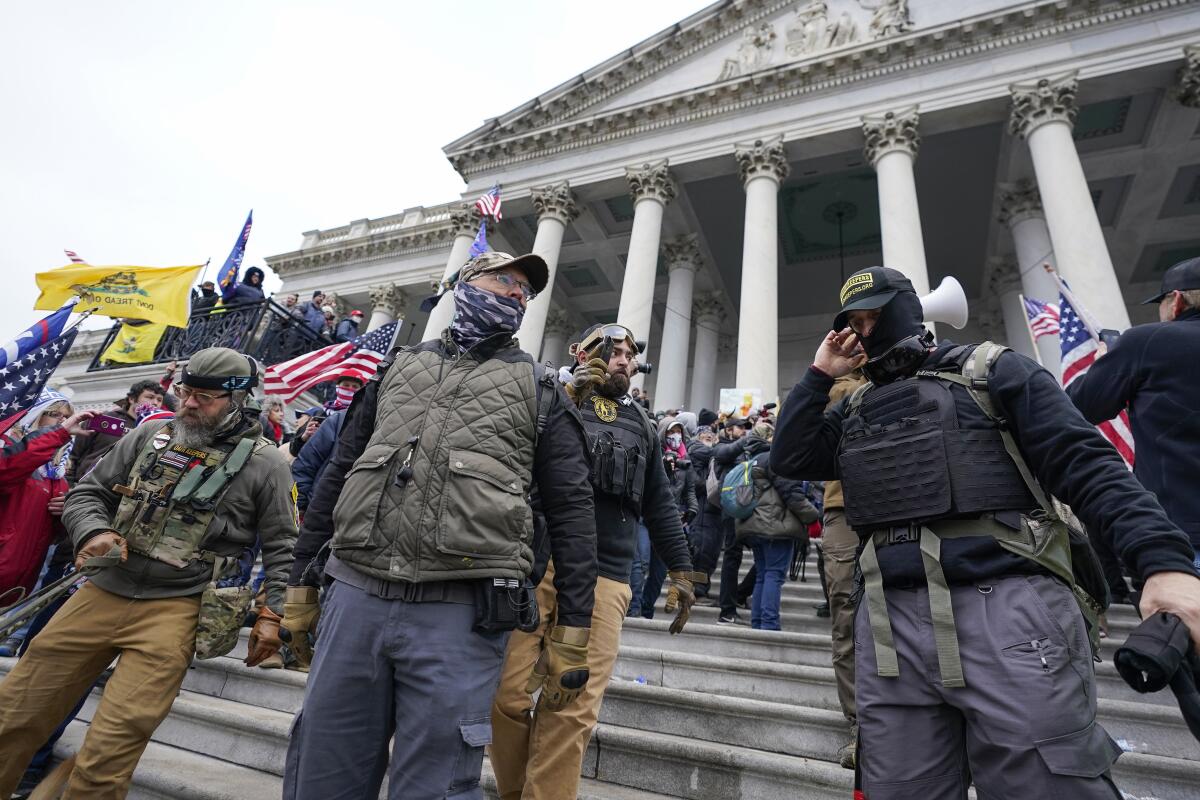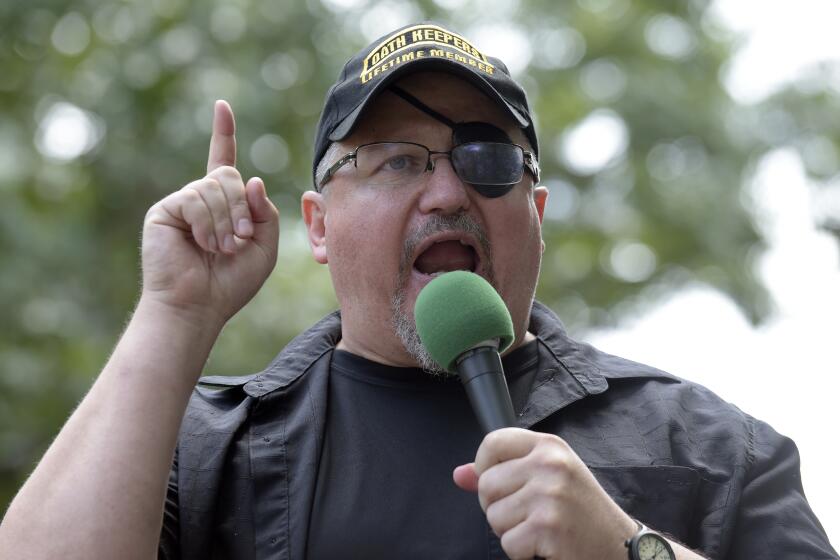Four Oath Keepers convicted of seditious conspiracy in Jan. 6 insurrection

- Share via
WASHINGTON — Four members of the Oath Keepers were convicted Monday of seditious conspiracy in the Jan. 6, 2021, Capitol attack, in the second major trial of far-right extremists accused of plotting to forcibly keep President Trump in power.
The verdict against Joseph Hackett of Sarasota, Fla.; Roberto Minuta of Prosper, Texas; David Moerschel of Punta Gorda, Fla.; and Edward Vallejo of Phoenix comes weeks after a jury convicted the group’s leader, Stewart Rhodes, in the mob’s attack that halted the certification of President Biden’s electoral victory.
It’s another victory for the Justice Department, which is also trying to secure sedition convictions against the former leader of the Proud Boys and four associates. The trial against Enrique Tarrio and his lieutenants opened this month in Washington and is expected to last several weeks.
The Washington jury in the Oath Keepers case deliberated for about 12 hours over three days before delivering the guilty verdict on the rarely used charge, which carries up to 20 years in prison. The four were also convicted of two other conspiracy charges, as well as obstructing an official proceeding: Congress’ certification of the 2020 election. Minuta, Hackett and Moerschel were acquitted of lesser charges.
The judge didn’t immediately set a date for sentencing and denied prosecutors’ bid to lock up the men while they await sentencing, finding that they are not at risk of flight. They were ordered to remain in home detention with electronic monitoring.
It was one of the most serious cases brought so far in the sweeping Jan. 6 investigation, which continues to grow two years after the riot. The Justice Department has charged nearly 1,000 people for participating in the riot, and the tally increases by the week.
Atty. Gen. Merrick Garland told reporters after the verdict that he is “grateful to the prosecutors, agents and staff for their outstanding work.”
Oath Keepers leader Rhodes and Florida chapter leader Kelly Meggs were convicted of seditious conspiracy in the previous trial, which ended in November. They were the first people in decades to be found guilty at trial of the Civil War-era charge. Three other Oath Keepers were cleared of the charge in that case but were found guilty of other serious crimes. All are awaiting sentencing.
Lawyers for Moerschel and Minuta suggested after the verdict that their clients were hurt by not being able to stand trial alongside Rhodes because the judge split the case into two groups. Moerchel’s lawyer, Scott Weinberg, said he could have pointed to Rhodes as the “real bad guy.”
“I think it would be easier to be a low-level person in the same case as Stewart Rhodes, who is basically the figurehead of this organization,” Weinberg said.
William Shipley Jr., Minuta’s attorney, said he was disappointed and “somewhat puzzled” by the verdict. He said that the government’s witnesses didn’t stand up to scrutiny, and that there were gaps in the evidence presented.
“We didn’t really think that in the 15 days of trial testimony, the government really had a good day,” Shipley said.
Vallejo left the courthouse without speaking to reporters. Hackett’s attorney, Angela Halim, declined to comment after the verdict.
The conviction hands the Justice Department a major victory in its prosecutions surrounding the Jan. 6, 2021, attempt to overturn President Biden’s win.
“We got a trial by residents of a small judicial district who in one way or another were almost all impacted by the events of Jan. 6,” Shipley said. “I think that raises some real troubling issues.”
Prosecutors told jurors that Rhodes and his band of extremists shortly after the 2020 election began to prepare an armed rebellion to keep Trump in power. Messages show Rhodes and the Oath Keepers discussing the prospect of a “bloody” civil war and the need to keep Biden out of the White House.
“Our democracy was under attack, but for the defendants, it was everything they trained for and a moment to celebrate,” prosecutor Louis Manzo told jurors in his closing argument.
Prosecutors alleged that the Oath Keepers amassed weapons and stashed them at a Virginia hotel for “quick reaction force” teams that could quickly shuttle guns into Washington to support their plot if needed. The weapons were never used.
Defense attorneys sought to downplay violent messages as mere bluster and said the Oath Keepers came to Washington to provide security at events before the riot. They seized on prosecutors’ lack of evidence that the Oath Keepers had an explicit plan to storm the Capitol before Jan. 6 and told jurors that the extremists who attacked the Capitol acted spontaneously, like thousands of other rioters.
“They left evidence out, and they picked and chose what they wanted,” said William Lee Shipley, an attorney for Minuta.
Prosecutors argued that while there is not evidence spelling out a plan to attack the Capitol, the Oath Keepers saw the riot as a means to an end and sprung into action at an apparent opportunity to keep Trump in power.
Hackett, Moerschel and other Oath Keepers approached the Capitol in a military-style stack formation before entering the building, according to prosecutors. Minuta and his group from a second stack of Oath Keepers clashed with police after heeding Rhodes’ call to race to the Capitol, according to court documents.
Prosecutors said Vallejo, a U.S. Army veteran and Rhodes ally, drove from Arizona to prepare with the quick reaction force at the hotel outside Washington. Jurors heard an audio recording of Vallejo talking about a “declaration of a guerrilla war” on the morning of Jan. 6.
Three other Oath Keepers have pleaded guilty to seditious conspiracy and agreed to cooperate with prosecutors in the hope of getting a lighter sentence. They are among about 500 people who have pleaded guilty to riot-related charges.
Richer reported from Boston. Associated Press reporters Lindsay Whitehurst and Andrew Harnik contributed from Washington.
More to Read
Get the L.A. Times Politics newsletter
Deeply reported insights into legislation, politics and policy from Sacramento, Washington and beyond. In your inbox twice per week.
You may occasionally receive promotional content from the Los Angeles Times.











